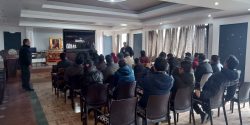
Dharamsala, January 10, 2019: In order to streamline, the WASH programme of the Tibetan community in India, the PC/SARD suggested that a geo-hydrological surveys to diagnose the groundwater situations of the key settlements be conducted so that it could systematically develop a plan to resolve the water and drinking water crises faced by many communities all over the world. Under the 2017-18 PRM programme, the Department of Health contracted the SPACE GEO-TECH, Bangalore to find solutions to the ongoing water crisis, to begin with, in 8 key Tibetan settlements in the South and Central India. Between the timeframe, the Geotech personals visited Bylakuppe Lugsum and Delar, Mundgod, Mainpat, Bhandara, Kollegal, Hunsur and Orissa settlements and successfully carried both surface and underground water status by acquiring satellite imageries and transacting fields where necessary. Eight voluminous reports has been produced with detail findings.
On 10th of January 2019, Department of Health in coordination with SARD conducted a meeting with all the head of Departments and project officers to discuss the major findings in all of these settlements and what are the proposed solutions. The meeting was honoured by the presence of Department of Religion and Culture’s Kalon Ven. Yuthok Karma Gelek and Department of Health’s Kalon Choekyong Wangchuk.
The Chief Planning Officer, Dr. Kunchok Tsundue initiated the meetings by highlighting global and Indian scenarios how scanty the resource has become over the years of wanton exploitations in the name of developments. All findings and reports suggested the time has come to not only take it seriously but bring conservation programmes to sustain next generations. It was followed by a power point presentation by WASH Project Officer, Ms. Sonam Dolma, on the ongoing projects and programme on WASH, the Department of Health.
Mr. Aswik Narayan from the Space Geo Tech presented a detailed inputs on the findings with maps and also focused on the key findings of the surveys. The findings depicted all settlements are on RED ZONE where management and conservation of both surface and ground water programme are needed to sustain the drinking water resources for the populace. Various suggestions such as Check dams, recharge points, percolation pits and channelling water loggings were suggested for each settlements depending on their potentials. He stressed before working on any intervention on WASH, location and maintenance is very crucial. He also suggested that for most of the settlements rain water harvesting is the best solution.
Participants have put forward several queries and comments. The additional Secretary of Department of Health, Mr. Jigme Tsering, provided valuable suggestions based on his experiences in Mundgod settlement and also some inferences for future WASH intervention. As a part of solutions, the additional secretary of the Department of Education, Mr. Jigmay Namgyal mentioned that water must be preserved through new and innovative technology such as flush in toilets. There are new flush technology available that could save our water in significant ways if properly adopted. Every house or building constructed must have norms such as collecting rood waters. It should begin here at CTA and then replicated all over the settlements. Many feedbacks and suggestions did come up on all fronts. Towards the end Mr. Kaydor Augatsang, SARD director suggested that SARD would like to try to find an external resource person who could lead the WASH programme in terms of providing technical expertise, if department so desired.
The meeting successfully ended with the Department of Health’s Secretary Tsegyal Chukya Dranyi’s suggestion that, in order to build the standard WASH programme, it would be best if there would be a well framed CTA policy in place focussing on resolving the issues/problems faced.
